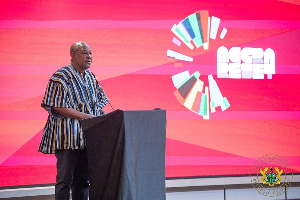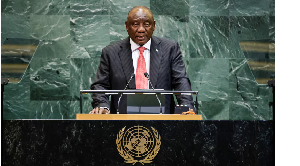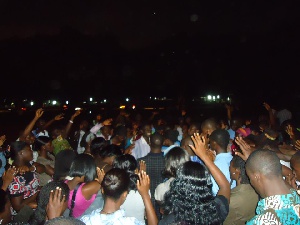Sekondi(W/R), April 28, GNA 97 The Western Regional Chairman of the Peace Advisory Council, Mr Kwaku Aggrey, has called on political parties in the country to revolve their manifestoes around the directive principles of state policy, ascribed in the 1992 Constitution.
He said all successive governments should continue with the uncomplete= d projects of previous administrations, to ensure an accelerated socio-economic development and to end the many abandoned projects dotted around the country.
Mr Aggrey made the suggestion at the regional launching of the 11th National Constitution Week celebration in Sekondi, on Thursday. This year's celebration under the theme: 93The State of Ghana's Democracy 2011" would be used to examine the country's democratic credentials in view of the incoming general elections. He noted that, meetings held by the Peace Council with the various political groups in the region showed that the country is polarized on political lines.
A situation, Mr Aggrey noted, has accounted for the persistent insults by the various political activists and fanatics in the media and on political platforms. Mr Aggrey indicated that, the insults and maligning by political activists had the tendency to create conflict and social unrest if not checked. "You must note that whoever you insult is an image of God and theref= ore human dignity must be respected at all times, no matter the party the perso= n supports or belongs to, because every human being is useful", he added. The Regional Chairman of the Peace Council charged all Ghanaians to join the crusade against insults, peddling of falsehood and character assassination in the country.
In a speech read on his behalf, the Western Regional Minister, Mr Paul Evans Aidoo said the 1992 Constitution is the main document that sets the standards for all Ghanaians and non-Ghanaian residents in the country, adding that, it is an instrument that measures our aspirations and defines our being.
He called on the entire citizenry to be abreast with the functions and objectives of the Constitution in order to protect and preserve the fundamental human rights and freedoms, unity and stability of the nation, saying, 93its function is crucial to whatever achievement the user could anticipate and must therefore be kept sharp at your finger tips all times= ". "It is with this in mind that the Government of the NDC, on assumpti= on of office, decided to set up a Commission to receive opinions from individuals and institutions across the country and beyond, on the fundamental law that govern their lives", he noted.
He said at the close of the first phase of the review exercise, over 80,000 submissions had been made to the Commission, which coalesced into 25 issues, such as local governance, powers of the executive, administration o= f justice, human rights, funding of political parties, chieftaincy and national security, among others. He said democracy is not just about elections but also about many othe= r issues bordering on the very existence of the individual, in addition to th= e functions and initiations of state institutions and public officials. Mr Aidoo charged the National Commission for Civic Education (NCCE) to encourage citizens' participation in the governance processes. Mr Kusi Aboraah, Western Regional Director of the NCCE noted that the Commission would not relent on its efforts at creating and sustaining awareness of constitutional democracy for the achievement of political, economic and social stability of the country.
Politics of Thursday, 28 April 2011
Source: GNA












